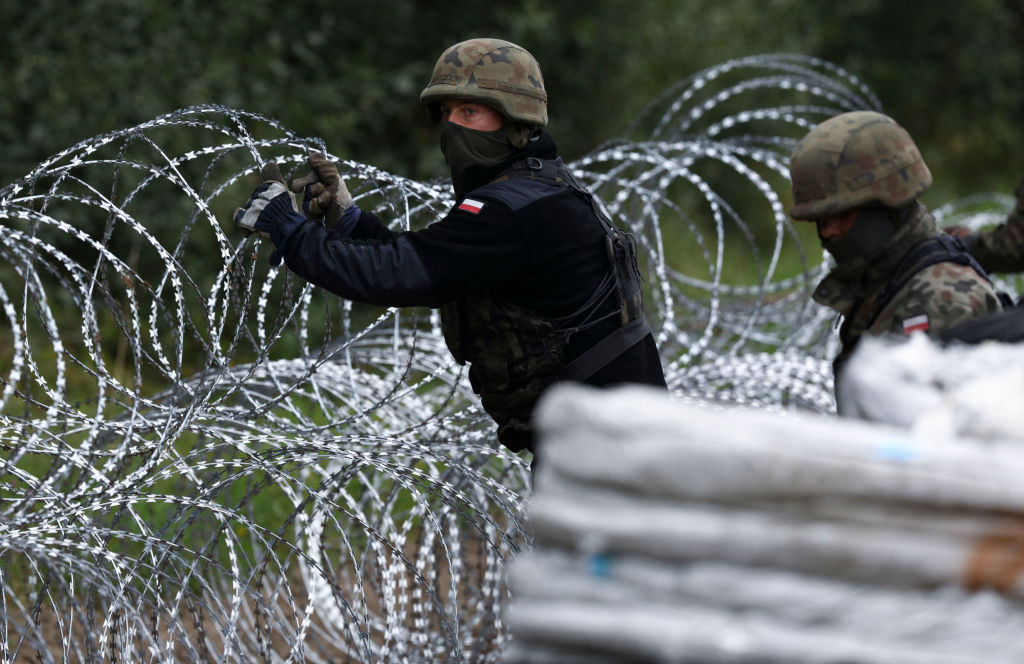
Poland’s ruling Law and Justice (PiS) party knew well what to expect from Belarusian President Alexander Lukashenko before he started funnelling refugees from the Middle East to the Polish border. Belarusian authorities had already done it to Lithuania and Latvia. And in a clear sign of what was to come, Belarus terminated its readmission agreement with the EU in October. Poland had time to pursue preventive measures in the refugees’ countries of origin. It didn’t, and now thousands of desperate people are huddling in the cold on the border, facing options that are either bad or very bad.
One reason why the PiS-led government failed to work with the EU to head off the crisis months ago is that it has been busy fighting EU institutions over its politicisation of Poland’s judiciary, among other issues. The irony, of course, is that PiS had previously gained notoriety for its government’s refusal to take in asylum seekers during the EU-wide refugee crisis of 2015. It should have been obvious at the time that the tables could easily turn—and now they have.
In procrastinating until refugees had already started massing at the border, PiS created an opportunity to stage a cynical show, performatively defending the Polish nation against foreign threats. Officials have since declared a state of emergency and held press conferences against a backdrop of armoured vehicles—moves intended to unite society behind the government by whipping up fear and patriotism. The Polish leadership also refuses to allow journalists into the border area, which leaves the impression that either it has something to hide or is paranoid. Meanwhile, Lukashenko lets reporters in, which helps him promote his version of events.
On the other side of the frontier are Belarusian forces, armed to the teeth and penning in the refugees at the border. Polish and Belarusian soldiers are only a few dozen metres apart, with several thousand desperate people between them. The situation is tense; a shot could be fired at any moment.
Were that to happen, the person in charge on the Belarusian side would be a mad dictator with a propensity for violence. Vivid displays of aggression are already routine for the Belarusian authorities. And, making matters worse, the most experienced military commanders on the Polish side have long since been pushed out by the PiS government.
Lukashenko seems to have concluded that he can best improve his position vis-à-vis the West and his most important ally, Russia, not by demonstrating that he is someone others can work with, but rather by showing that he is capable of anything. After all, his regime has already hijacked a civilian flight traveling between two EU member states just to detain a young journalist onboard. With each provocation, the message to both Russia and the West is clear: ‘If you try to swallow me, I will stick in your throat and choke you.’
The PiS government has left Poland increasingly isolated, having spoiled relations with every ally except the most pro-Russian country in the EU, Viktor Orban’s Hungary. Poland is now a pawn, as can be seen by the decision of German Chancellor Angela Merkel and French President Emmanuel Macron to bypass the Polish government and discuss the migration crisis in calls with Lukashenko and Russian President Vladimir Putin.
Polish citizens now must place all their faith in the remaining goodwill of the EU and NATO. But while Article 5 of the NATO treaty ensures mutual defence against external aggression, it does not specify how allies should respond. Should they send an army or simply create a commission of inquiry? In an age of hybrid warfare, good relations with allies are everything. Poles are safe as long as we are on good terms with Germany, France and the United States. Unfortunately, those relationships are currently in tatters.
The Polish government’s refusal even to ask for international assistance has exacerbated the crisis on the border. Involving Frontex (the EU Border and Coast Guard Agency) would have immediately changed the calculus for Belarus and Russia. An attack on a Polish officer is one thing, but an attack on officers from all EU countries would be quite another. Nor has the Polish government bothered to invoke Article 4 of the NATO Treaty, even though this would trigger an immediate consultation among the allies.
Another reason why Poland was so unprepared for this crisis is that PiS has worked diligently to divide Polish society and the political elite. Desperate to thwart any kind of interparty consensus, the government has not invited the opposition to the country’s National Security Council. But even if it did, opposition politicians would have every reason to suspect that they were being led into a trap. Either way, the focus would remain on jockeying for political advantage, not on building solidarity in the face of a hostile threat.
A united front between PiS, the leading opposition party, Civic Platform, and others would be much easier for political leaders in Berlin, Paris and Washington to support. Civic Platform’s leader, former European Council President Donald Tusk, maintains good relations with Poland’s erstwhile partners and allies. During the last EU summit in Brussels, he held meetings with the most important heads of state and government, whereas Polish Prime Minister Mateusz Morawiecki was mostly shunned.
Standing on their own, Morawiecki and his puppet master, PiS Leader Jaroslaw Kaczynski, are more likely to inspire schadenfreude than sympathy. But this could be a crucial moment for the opposition, which collectively polls better than PiS. Now that Poland is facing a real threat—and not a spectre conjured by Germanophobia or Euroscepticism—world leaders should remember that PiS is not synonymous with Poland.
Poland is still a country worth believing in, even if part of its political elite is doing everything possible to turn it into a basket case. Poland is not only Kaczynski, and the country itself deserves support, even if its government does not.

